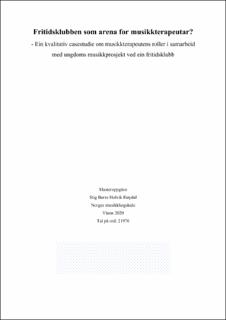| dc.contributor.author | Høydal, Stig Børre Holvik | |
| dc.date.accessioned | 2020-11-02T12:20:18Z | |
| dc.date.available | 2020-11-02T12:20:18Z | |
| dc.date.issued | 2020 | |
| dc.identifier.uri | https://hdl.handle.net/11250/2686058 | |
| dc.description | Norges musikkhøgskole. Masteroppgave. Musikkterapi | en_US |
| dc.description.abstract | English title: The leisure club as an arena for music therapists? - A qualitative case study on the music therapist's roles in collaboration with adolescents’ music projects at a leisure club
This study conveys practice-close research around a music therapist's practice with adolescents in leisure club context in a health-promoting/preventative perspective. Theme and focus are four adolescents’ experiences of collaborating with a music therapist around their music projects in a leisure club's studio, and the music therapist's roles in the collaboration. The methods of data collection is individual, semi-structured interviews with audio recording and transcription with four participants and participant observation with notes. The study is a qualitative, intensive and explorative case study that utilizes phenomenological and hermeneutic philosophy of science. The method of analysis is strongly inspired by thematic analysis. The study presents theoretical perspectives related to youth phase, music and identity, the leisure club, music therapy, person-oriented strategy and different relational perspectives. The research results identify four roles; music therapist as expert-musician, music teacher, music helper and friend. The roles of the music therapist and the youth's experiences are discussed through theoretical perspectives and the researcher’s reflections. Topics discussed relate to the identified roles and opportunities, challenges and conditions for music therapy practice in informal setting. The study's findings indicate that the music therapist's different roles and therapeutic skills can make a positive difference in the adolescents’ everyday life. The study suggests that the leisure club may be an ideal practice arena for music therapists in informal health-promoting/ preventative youth work against marginalization.
Keywords: music therapy, community music therapy, leisure club, adolescent, health-promoting, preventive, collaborative, person-oriented strategy, therapist role, relational perspectives, marginalization | en_US |
| dc.description.abstract | Samandrag -
Denne studien formidlar praksisnær forsking rundt ein musikkterapeuts praksis med ungdommar i fritidsklubbkontekst i eit helsefremmande og førebyggande perspektiv. Tema og fokus er fire ungdommars opplevingar av samarbeid med ein musikkterapeut rundt deira musikkprosjekt i eit musikkstudio i ein fritidsklubben, og musikkterapeutens roller i samarbeidet. Metode for primærdatainnsamling er individuelle, kvalitative, semistrukturerte forskingsintervju med lydopptak og transkripsjon med fire ungdommar, samt deltakande observasjon med observasjonsnotat. Studien er ein kvalitativ, intensiv og eksplorativ casestudie som nyttar seg av fenomenologisk og hermeneutisk vitskapsfilosofi. Analysemetode er sterkt inspirert av tematisk analyse. Studien presenterer teoretiske perspektiv relatert til ungdomsfasa, musikk og identitet, fritidsklubbarenaen, musikkterapi, personorientert strategi og ulike relasjonelle perspektiv. Forskingsresultata identifiserer fire roller; musikkterapeuten som ekspertmusikar, musikklærar, musikkhjelpar og venn. Musikkterapeutens roller og ungdommanes opplevingar diskuterast gjennom teoretiske perspektiv og forskarens refleksjonar. Tema som diskuterast knytast til dei identifiserte rollene og moglegheiter, utfordringar og føresetnadar i musikkterapeutisk praksis i uformell setting. Studiens funn tydar på at musikkterapeutens ulike roller og terapeutiske kompetanse kan gjere ei positiv forskjell i ungdoms kvardag. Studien foreslår at fritidsklubben kan vere ein ideell praksisarena for musikkterapeutar i eit uformelt helsefremmande og førebyggande ungdomsarbeid mot marginalisering.
Stikkord: musikkterapi, samfunnsmusikkterapi, fritidsklubb, ungdom, helsefremmande, førebygging, samhandling, personorientert strategi, terapeutrolle, relasjonelle perspektiv, marginalisering. | en_US |
| dc.language.iso | nno | en_US |
| dc.publisher | Norges musikkhøgskole | en_US |
| dc.relation.ispartofseries | Norges musikkhøgskole. Masteroppgave. Musikkterapi;2020 | |
| dc.subject | music therapy | en_US |
| dc.subject | community music therapy | en_US |
| dc.subject | leisure club | en_US |
| dc.subject | adolescent | en_US |
| dc.subject | health-promoting | en_US |
| dc.subject | preventive | en_US |
| dc.subject | collaborative | en_US |
| dc.subject | person-oriented strategy | en_US |
| dc.subject | therapist role | en_US |
| dc.subject | relational perspectives | en_US |
| dc.subject | marginalization | en_US |
| dc.subject | musikkterapi | en_US |
| dc.subject | samfunnsmusikkterapi | en_US |
| dc.subject | fritidsklubb | en_US |
| dc.subject | ungdom | en_US |
| dc.subject | helsefremmande | en_US |
| dc.subject | førebygging | en_US |
| dc.subject | samhandling | en_US |
| dc.subject | personorientert strategi | en_US |
| dc.subject | terapeutrolle | en_US |
| dc.subject | relasjonelle perspektiv | en_US |
| dc.subject | marginalisering | en_US |
| dc.title | Fritidsklubben som arena for musikkterapeutar? Ein kvalitativ casestudie om musikkterapeutens roller i samarbeid med ungdoms musikkprosjekt ved ein fritidsklubb | en_US |
| dc.title.alternative | The leisure club as an arena for music therapists? A qualitative case study on the music therapist's roles in collaboration with adolescents’ music projects at a leisure club | en_US |
| dc.type | Master thesis | en_US |
| dc.subject.nsi | VDP::Humaniora: 000::Musikkvitenskap: 110::Musikkterapi: 113 | en_US |
| dc.source.pagenumber | 78 s. | en_US |
